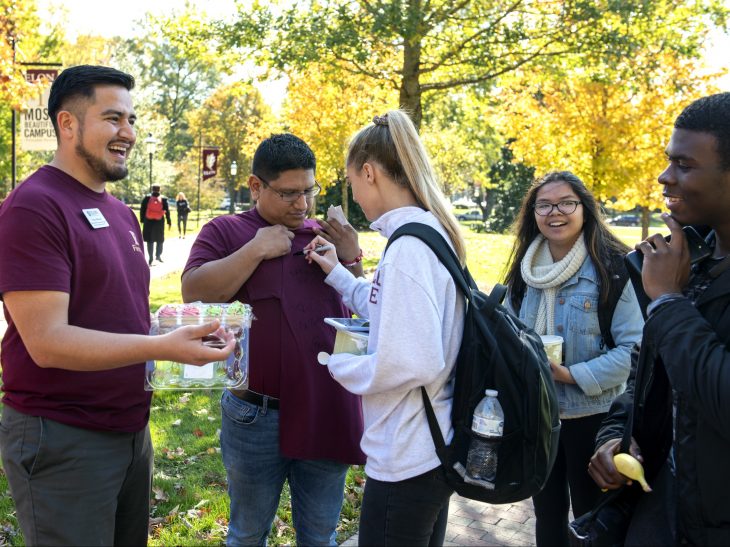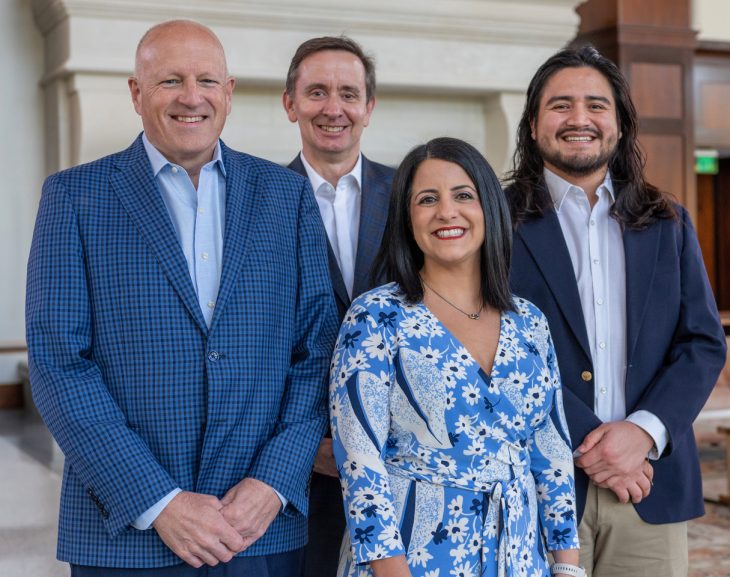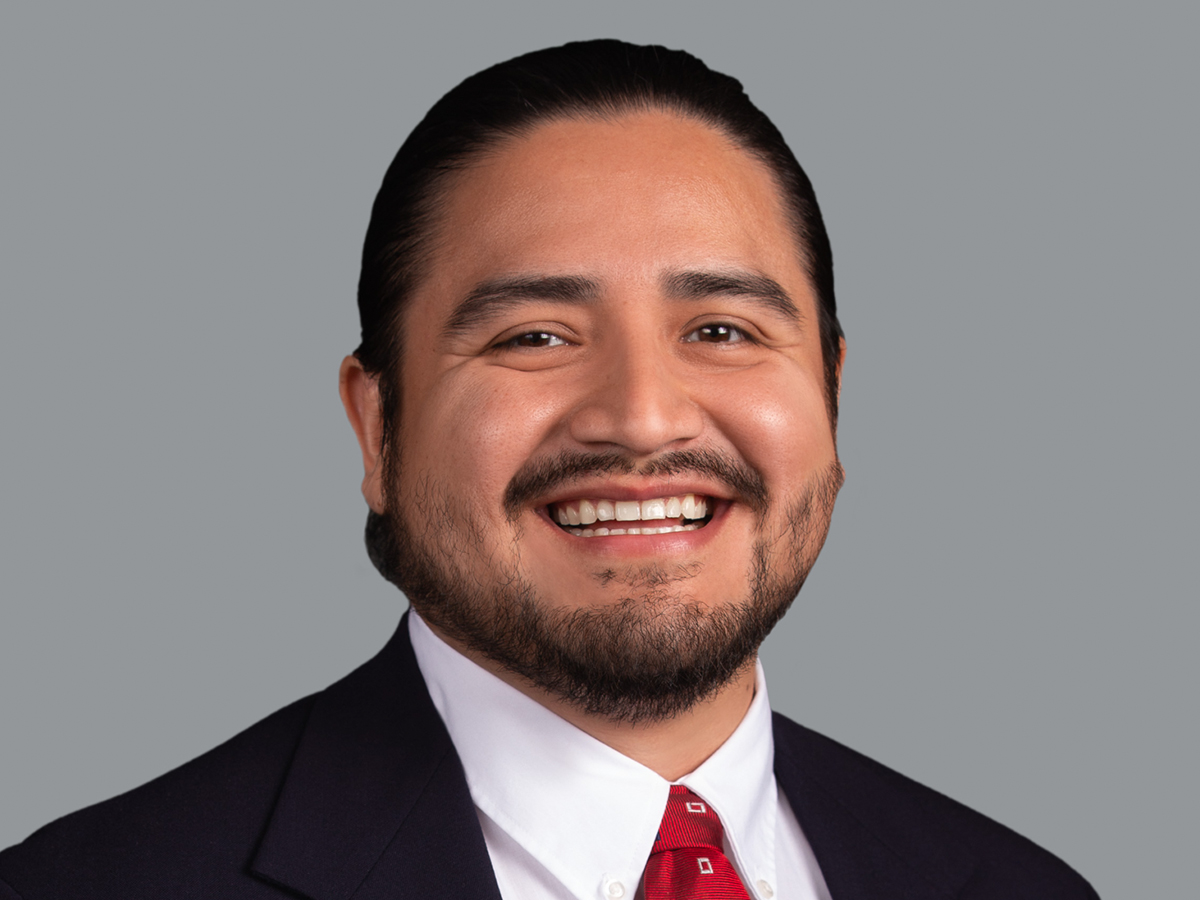Miranda Tapia '17 prides himself on being able to make a space when there is none for the Latinx/Hispanic community.
Oscar Miranda Tapia ’17 left Mexico for the United States on a journey that would bring him to Elon University as an undergraduate. While he left his home country, he did not leave his Latino identity.
“I am an immigrant who left Mexico at a very young age and my identity keeps me tied there,” Miranda Tapia said. “My Latino identity means everything to me.”
Each year, Hispanic Heritage Month provides Miranda Tapia an opportunity to celebrate his culture and share it with others. Even outside of this annual celebration, Miranda Tapia is focused on creating spaces of belonging and support for Latinx/Hispanic people that allow them to bond over their shared experiences and lift up their culture more broadly.
“Coming from Mexico and not thinking that I would be able to go to college, but then being able to go to college and have this impact on my peers, my community and those around me,” said Miranda Tapia. “It makes me proud seeing the ripple effects of my contributions.”
A first-generation college student, Miranda Tapia arrived to begin his higher education journey at Elon University through the Golden Door Scholarship program. This scholarship is provided to undocumented college students and he also received support from the Odyssey Program.
Throughout his educational journey, Miranda Tapia has placed an importance on community, mentorship and cultural pride, all aspects he said have contributed to his success. More resources are needed to allow younger members of the Latinx/Hispanic community to elevate and enrich their experiences, as well as maximize institutional support. Hispanic Heritage Month plays an important role in celebrating culture and educating younger generations, including his own siblings. He is the oldest of three siblings, and one of two to have been born in Mexico.
“It’s beautiful to see and pass down my culture to my siblings,” he said. “I love it when they begin to develop the awareness of their own culture and begin to take pride in it,” he said.

Miranda Tapia’s journey has not always been smooth. He credits The SMART Mentoring Program for keeping him at Elon during his first semester.
“I wanted to transfer from Elon because I didn’t feel like I belonged,” Miranda Tapia said.
The SMART Mentoring Program aims to connect first-year and transfer ALANAM (African-American/Black, Latinx/Hispanic, Asian, Pacific Islander, Native American, Alaskan Native and Multiracial) students to mentors on campus that will help provide peer support. He found himself in spaces where he was surrounded by the majority and many were from different socio-economic backgrounds.
“The SMART Mentoring Program was the first organization that I joined as a first-year student that provided me with a community,” he said. “The organization allowed me to stay and find my community.”
He also joined what, at the time, was called the Latin American Student Organization (LASO) and is now the Latinx/Hispanic Union (LHU).
“I joined the organization my freshman year and to me it was important because it provided me an opportunity to be able to connect with my culture,” Miranda Tapia said.
LHU is an organization that aims to create unity in the Latinx/Hispanic community, foster diversity at Elon and advocate on issues. He served as president of the Latin American Student Organization and after graduating, Miranda Tapia helped create the Latinx Hispanic Alumni Network (ELHAN). ELHAN was established to unite and represent the interests of Latinx/Hispanic alumni. The organization helped students, faculty and staff to build connections at Elon and then continue to foster them once they leave.
“Having been born in Mexico and coming to the United States, it just filled my cup to be able to lead this organization,” said Miranda Tapia.
Miranda Tapia was also involved in Elon Academy, the university’s intensive, three-phase college access and success program for academically promising high school students in Alamance County who may have a financial need or no college history in their family. The program aims to strengthen leadership, college-going knowledge, family involvement and more. Through his work with Elon Academy, he was able to help first-generation students like himself who came from low-income backgrounds navigate the college application process and increase their access to the transformative experience of higher education.
“My job was to help them with the college application process, developing college going habits and making sure that they were doing what they needed to do inside and outside of the classroom,” said Miranda Tapia. “This program was significant because it provided me with a purpose. It provided me with an opportunity to be able to give back to the community that I come from and help similar students get into higher education.”
After graduating from Elon, Miranda Tapia was selected for a Kenan Community Impact Fellowship, which is a partnership that pairs recent Elon graduates with Alamance County organizations for a year of service. He worked with Alamance Achieves for one year with a fellowship that was focused on kindergarten, early childhood development and education. Alamance Achieves is a partnership of leaders with various backgrounds from all over Alamance County. Following his year of service, Miranda Tapia headed to Harvard University to complete a master’s degree in higher education before returning in 2019 to his alma mater to support a new initiative.

Miranda Tapia was the first to lead First-Generation Student Support Services, which was a newly created program housed at the Center for Access and Success. The program is geared toward students that have similar backgrounds to Miranda Tapia, which made him feel grateful for coming back to Elon and serving in that same capacity for three years. Miranda Tapia said Esther Freeman, who was then the director of the Odyssey Program, took him under her wing.
“It was a full circle moment where I had the support and mentoring from the Odyssey program when I was in undergrad there,” said Miranda Tapia.
Miranda Tapia is now three years into his work toward a doctorate in educational leadership, policy and human development with a concentration in higher education opportunity, equity and justice from N.C. State University. He will soon be working on his dissertation and expects to graduate in May 2026.
“I realized I needed to strengthen my research skills to be able to make the change that I wanted to have,” Miranda Tapia said.
Miranda Tapia has continued to build connections through student organizations as he pursues his doctorate and is now a co-founder and co-president of the Latine Graduate Student Association at N.C. State University.
“When I arrived at N.C. State it was very much this feeling of, ‘Where is the Latino community?’ I know that we exist, but we’re navigating our graduate education in silos,” said Miranda Tapia.
The creation of this organization was a big accomplishment for Miranda Tapia and he gives credit to his peers who were with him through the process of making the organization happen.
“Being able to do this work is not just work, it’s something personal,” he said.
In 2023, Miranda Tapia co-authored “Connections Are Everything: A College Student’s Guide to Relationship Education” with President Emeritus Leo M. Lambert, Assistant Provost Peter Felten and Isis Artze-Vega, college provost and vice president for academic affairs at Valencia College. The book, published by Johns Hopkins University Press, results from more than 200 interviews with college students and makes the case for the role of relationships in student success. Miranda Tapia was also named a Top 10 Under 10 alumnus by Elon in 2024.

Miranda Tapia is currently working on a project looking at the experiences of undocumented college students as they transition into the workforce. He is examining what colleges and universities are doing or not doing to aid them in this transition, as well as uplift and highlight their experiences.
“It’s an opportunity to take the experiences that I’ve had as an undocumented individual and also the experiences of those that I’ve worked with and try to create some positive change to benefit this community,” said Miranda Tapia.
Miranda Tapia would like to be able to create a program that helps members of the Latinx/Hispanic community and those who have a similar background to him, similar to the “It Takes a Village” Project at Elon. He would like to do the necessary research into what’s affecting this population, build the case for a program and support individuals through program participation.
“To me, belonging means having a space that everyone can thrive in – an environment filled with connections to folks that look like you and have a similar background,” said Miranda Tapia. This is something Vice President Emeritus Jean Rattigan-Rohr, who was his supervisor in the Center for Access and Success, did during her career at Elon by launching the “It Takes a Village” Project, which has expanded its impact on local school children and their families. He wants to impact the Latinx/Hispanic community in a similar way.
“It was so inspiring to be able to see how she not only implemented the program, but backed it by research and used grants to fund and expand this program,” said Miranda Tapia.



